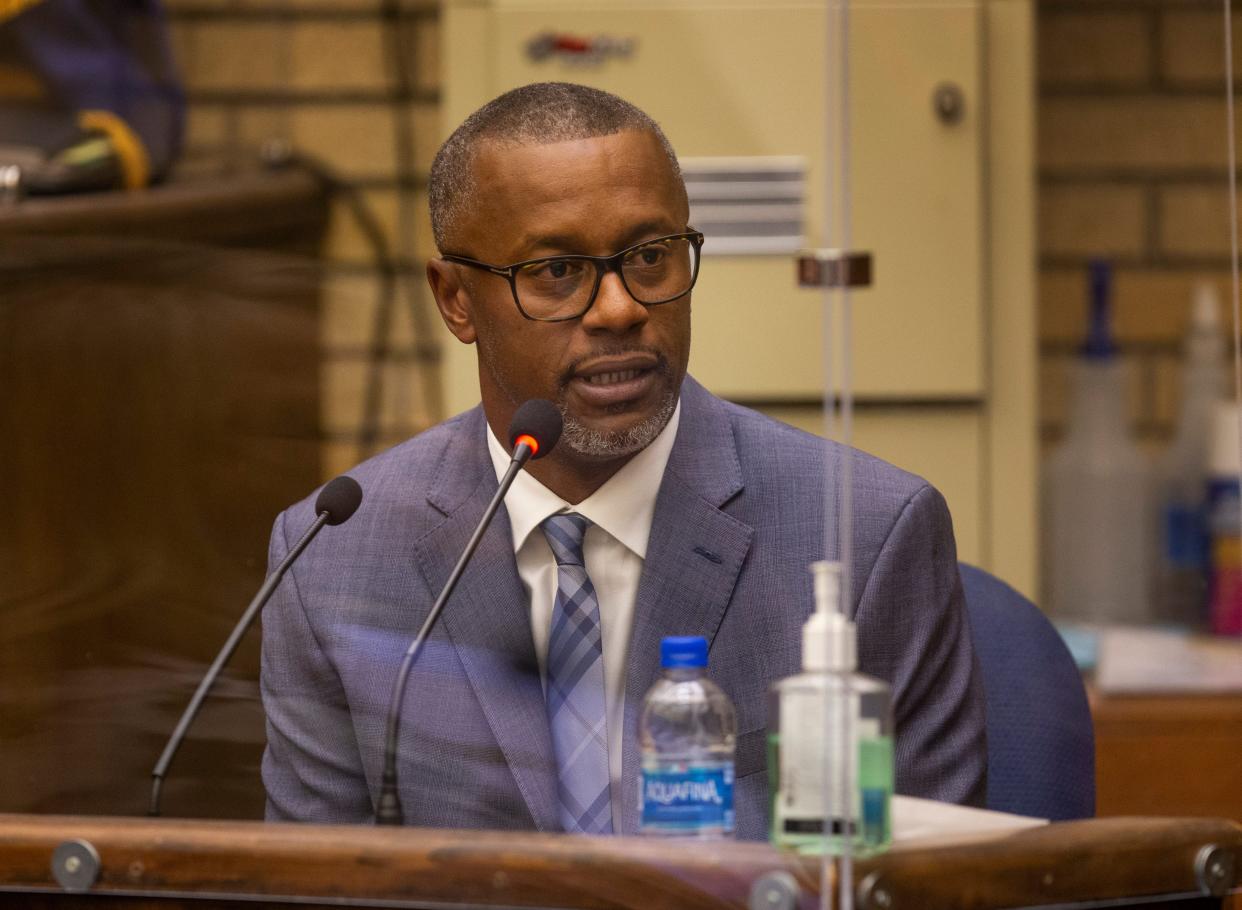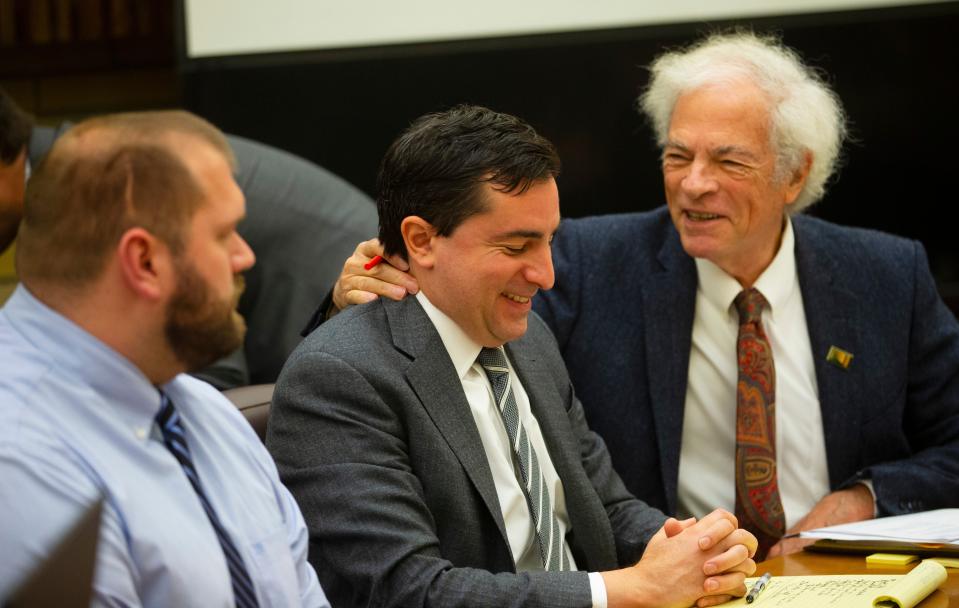Willie Taggart testifies in $100 million suit filed by former player at Oregon

- Oops!Something went wrong.Please try again later.
EUGENE, Oregon — Willie Taggart doesn't know why two former University of Oregon football players described their first conversation with their new head coach as "chilling."
Taggart, the current head football coach at Florida Atlantic, recalls his talk with former offensive linemen Doug Brenner and Henry Mondeaux as a good one.
"I don’t think anybody would look at me and think I’m a chilling person," Taggart testified Thursday in Lane County Circuit Court. "That’s not who I am."
Taggart recalled being "really excited" to step in as the Ducks head coach because the team had "all the ingredients to be highly successful" even though they'd struggled the previous season. He testified that when he spoke with Brenner and Mondeaux, they confirmed things he'd heard from others, and the three of them talked about what needed to happen moving forward.
Taggart, Owls enjoy spring practice: FAU football: Willie Taggart enjoys spring first, Owls heat up positional battles
Taggart adds new coaches: FAU football: Willie Taggart rounds out coaching staff with 4 new hires
Both players have described the interaction differently while testifying in the civil lawsuit that Brenner filed against Taggart, the university, another former coach and the NCAA that centers around three days of controversial workouts in early 2017.
In the lawsuit, Brenner says players were required to perform hundreds of pushups and up-downs without rest and were denied water during the first day of conditioning as coaches told them to keep at it and said if they stopped, they were quitting on their teammates and the team.
Brenner is seeking $100 million from the NCAA as a punitive measure and $25.5 million from UO, Taggart and former strength coach Irele Oderinde for pain and suffering stemming from the series of controversial workouts in 2017.
Shortly after he arrived in Eugene in late 2016, Oderinde was suspended for one month without pay following the hospitalization of Brenner, fellow offensive lineman Samuelu Poutasi and tight end Cam McCormick after workouts Oderinde led.

All three players were diagnosed with rhabdomyolysis, a potentially life-threatening condition in which muscle tissue breaks down and is secreted through urine. Poutasi filed a similar lawsuit as Brenner but settled just before the trial was set to begin, and McCormick chose not to file a lawsuit.
Taggart testified Wednesday afternoon and Thursday morning as attorneys for UO and the two coaches started making their case before the jury. On Wednesday, Taggart's testimony focused on his background and his coaching philosophy.
Taggart talked about growing up south of Tampa and how his upbringing taught him how to work hard and treat others how he wanted to be treated.
He was an "alright" athlete in high school and had dreams of making it to the NFL to buy his mom and dad a house, he testified. Jim Harbaugh, who was playing for the Chicago Bears at the time, helped recruit Taggart to Western Kentucky University, where his father Jack Harbaugh was the coach.
Taggart credited Jack Harbaugh with showing him discipline, teaching him the game of football and inspiring him to be a coach.
"I figured if he could change my life, I could change (life) for a lot of young men," he testified.
When Taggart didn't get any calls from the NFL, he started his career in coaching, first at WKU then at Stanford under Jim Harbaugh, back to Western Kentucky and then to the University of South Florida before getting the call from Oregon.
Taggart testified punishment is not a tenet of his coaching philosophy and said he doesn't have a win-at-all-costs attitude.
Instead, he said, his philosophy centers on discipline, excellence, accountability and bringing players together as a team. He tells players they'll "chase greatness and catch excellence along the way," he testified Thursday as his testimony shifted toward his time at Oregon.
Taggart remembered thinking it was unusual that the university had let a lot of the coaching staff go before he arrived, saying that wasn't typical when he had taken over at other programs.
He also talked about the first team meeting, which has been a point of criticism from Brenner and his attorneys and other players.
During that meeting, Taggart said he would plow the field, find the snakes in the grass and chop their heads off. That's something he got from Jack Harbaugh, he said, and has "nothing to do with physical harshness toward people."
Taggart testified he uses the phrase "at every first meeting when I take over the job" and that it means he'll cut people from the team if they violate the rules.
One example he remembered specifically was telling players to stay away from Taylor's Bar and Grill because it seemed like nearly all the misconduct from the previous year started at the popular drinking establishment near the UO campus, which has since closed after having its liquor license revoked.
He clarified that at the time, he didn't think there were many so-called snakes. He added he only let one person go, which he said was "a credit to our players because they bought into what we were doing."
'The first time we ever went that long'
During the conditioning workouts at the center of the lawsuit, Taggart wasn't in Oregon.
He testified while he was at a coaches' convention and recruiting, he did know what his staff had planned for workouts.
Taggart had gone through the same workout before, he said, with the purpose being for players to do the warmup in unison to work together and "lean on each other" then move on to weight lifting. He added while he was watching games from the previous season, he though the team lacked unity.
"Unfortunately, here our guys didn’t get it as fast as other teams," Taggart said. "That was the first time we ever went that long (with pushups and up-downs), and it was a mistake."
Taggart first learned the three players had been hospitalized and diagnosed with rhabdomyolysis through a call from the university's director of athletic medicine.
He remembered the first word out of his mouth being "Damn" and described it as "a bump in the road that we didn't want to happen."
Once Taggart returned, there's "no question in my mind" that he visited Brenner in the hospital.
Brenner has previously testified Taggart didn't visit him, and Brenner's mother couldn't recall seeing the head coach at the hospital when she testified.
Taggart said it's never been his intent to hurt anyone and added if he wanted a player gone, he would have just dismissed them, not punished anyone.
Defense for university, coaches making case
Defense attorneys for the UO, Taggart, Oderinde and the NCAA have not contested the workouts led to the players' hospitalization and subsequent rhabdomyolysis diagnosis, which Brenner testified has "completely altered the course of (his) life."
The rhabdo diagnosis and related issues crushed Brenner's dreams of playing in the NFL. Brenner's ongoing hip issues, which required surgery, started after the workouts, hospitalization and recovery
On Tuesday, defense attorneys started making their arguments with testimony from Rick Spielman, who served as general manager for the Minnesota Vikings from 2012 until Jan. 10, 2022.
Spielman told jurors he'd reviewed Brenner as he would other potential recruits, including more than 30 hours watching game tapes.
His ultimate conclusion: Brenner "was not an NFL prospect" based on his evaluation.
This article originally appeared on Palm Beach Post: FAU coach Willie Taggart testifies in lawsuit brought by Oregon player

